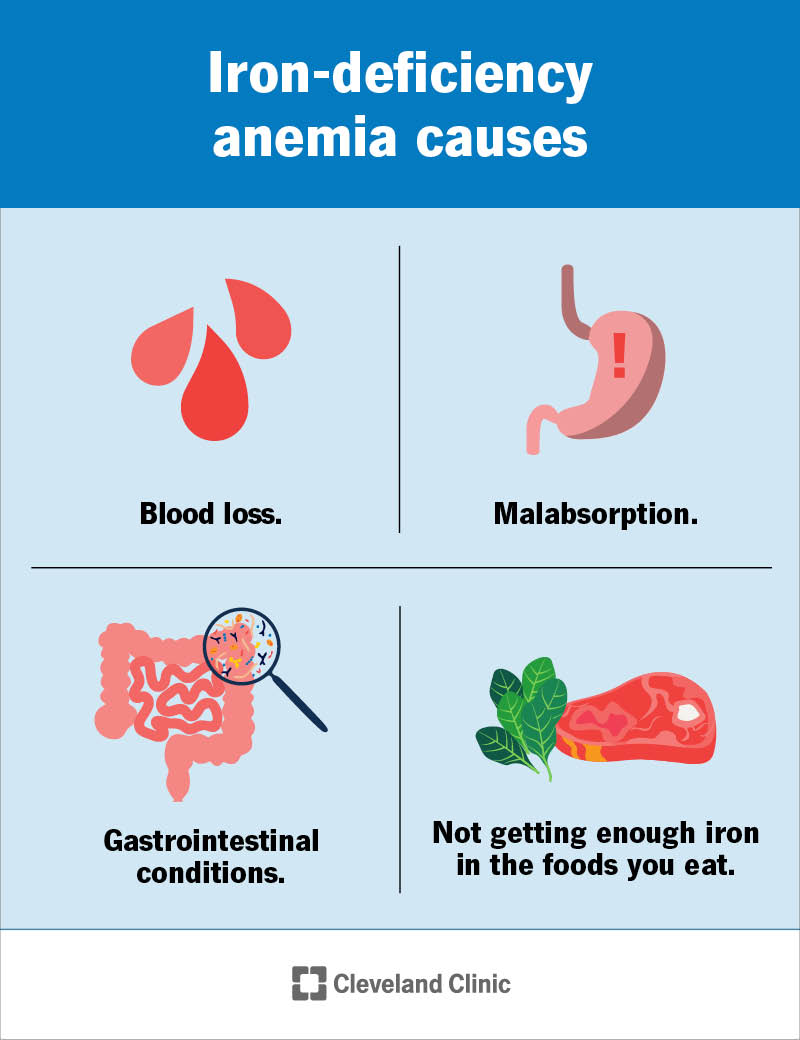Iron-deficiency anemia is a common blood disorder that affects your red blood cells. Symptoms tend to develop over time and may include fatigue, shortness of breath or a racing heart rate. Healthcare providers treat iron-deficiency anemia with iron supplements or infusions and by addressing any underlying health conditions.
Advertisement
Cleveland Clinic is a non-profit academic medical center. Advertising on our site helps support our mission. We do not endorse non-Cleveland Clinic products or services. Policy

Image content: This image is available to view online.
View image online (https://my.clevelandclinic.org/-/scassets/Images/org/health/articles/iron-deficiency-anemia)
Iron-deficiency anemia is a common blood disorder that affects your red blood cells. It’s the most common form of anemia. It happens when there’s a lack of iron in your blood, usually caused by bleeding.
Advertisement
Cleveland Clinic is a non-profit academic medical center. Advertising on our site helps support our mission. We do not endorse non-Cleveland Clinic products or services. Policy
When you don’t have enough iron, your bone marrow can’t make hemoglobin, the molecule in your red blood cells that carries oxygen in your blood. And when you don’t have enough hemoglobin, your blood can’t carry oxygen throughout your body.
As a result, you might feel tired. You may notice pale skin and cold hands and feet. Iron-deficiency anemia can also make you feel dizzy or lightheaded. Occasionally, it can cause chest pain, a fast heartbeat and shortness of breath. Or it can cause you to crave non-food items like ice, dirt or paper. These are all signs of iron-deficiency anemia.
The good news is that treatment can help iron-deficiency anemia. Your healthcare provider can design a plan tailored to your needs.
Normally, your body absorbs iron from the foods you eat. Your body stores iron so it’s available to make hemoglobin. Iron-deficiency anemia develops when your body uses the iron stores faster than they can be replaced, or when the flow of iron into your system slows.
This occurs in three stages:
Advertisement
Iron-deficiency anemia symptoms usually start out mild but worsen over time. They can include:
Causes of iron-deficiency anemia may include:
Statistically, you’re more likely to develop iron-deficiency anemia if you:
Severe or untreated iron-deficiency anemia can lead to complications like:
Healthcare providers use blood tests to diagnose iron-deficiency anemia. In addition to measuring iron levels, they check your levels of ferritin and total iron-binding capacity (TIBC) to confirm that you have a deficiency.
Your healthcare provider may run different lab tests depending on your situation.
Healthcare providers use iron supplementation or replacement to treat iron-deficiency anemia. They do this with:
Your healthcare provider can determine which type of iron-deficiency anemia treatment is right for you. Most importantly, they’ll also try to figure out why you’re low in iron so they can treat the underlying cause.
Iron supplementation might cause a metallic taste in your mouth or gastrointestinal side effects like:
Tell your healthcare provider if you develop these side effects. They may be able to reduce them by adjusting your iron dosage or regimen.
It depends on the treatment you receive and how low your iron was to begin with. People who take iron supplements may notice a difference in about two to three weeks. If you have iron infusions, you might start to feel better a little sooner.
The outlook is good with treatment, but your healthcare provider will need to address any underlying conditions that cause iron-deficiency anemia. Iron supplementation is only a temporary fix because it doesn’t address the actual cause.
Advertisement
Suddenly becoming iron-deficient might point to conditions like stomach ulcers or colon polyps. In some cases, it can be a sign of gastrointestinal cancer. It’s important to figure out why you’re iron-deficient so you can get the right treatment.
Yes, you may be able to prevent iron-deficiency anemia if it’s detected and treated early enough. If you’ve already developed iron-deficiency anemia, a healthcare provider can easily correct the condition with treatment.
Here are some ways to make sure you’re getting enough iron:
You can increase your body’s iron stores by eating an iron-rich diet. Here are some foods to consider:
Advertisement
Eating fortified, iron-rich foods is always a good idea. But it won’t necessarily keep you from getting iron-deficiency anemia. If you have extremely low iron, you’ll likely need to see a healthcare provider for recommendations regarding iron supplements or iron infusions.
If you follow a vegan or vegetarian diet, look for iron-fortified breads and cereals. There are several non-meat options for boosting your iron intake, like beans, tofu, dried fruits and dark leafy greens.
You can also try iron supplements. Always talk to your healthcare provider before adding any supplement to your regimen.
You should see your healthcare provider regularly so they can monitor your iron levels and your overall health. You might see your healthcare provider every three months for a year or longer if you’re being treated for iron-deficiency anemia. You may also need to see another specialist like a gynecologist or gastroenterologist if bleeding is determined to be the cause.
If you’ve received an iron-deficiency anemia diagnosis, here are some questions you might want to ask your healthcare provider:
Advertisement
We all have days when our responsibilities outweigh the amount of energy we have. But if you have iron-deficiency anemia, you might not be able to shake those feelings of fatigue. Tell your healthcare provider if you’re tired all the time. They can run tests to determine a cause and recommend appropriate treatment.
Learn more about the Health Library and our editorial process.
Cleveland Clinic's health articles are based on evidence-backed information and review by medical professionals to ensure accuracy, reliability, and up-to-date clinical standards.
Cleveland Clinic's health articles are based on evidence-backed information and review by medical professionals to ensure accuracy, reliability, and up-to-date clinical standards.
Living with a noncancerous blood disorder can be exhausting. But there’s hope. Cleveland Clinic’s classical hematology experts provide personalized care and support.
